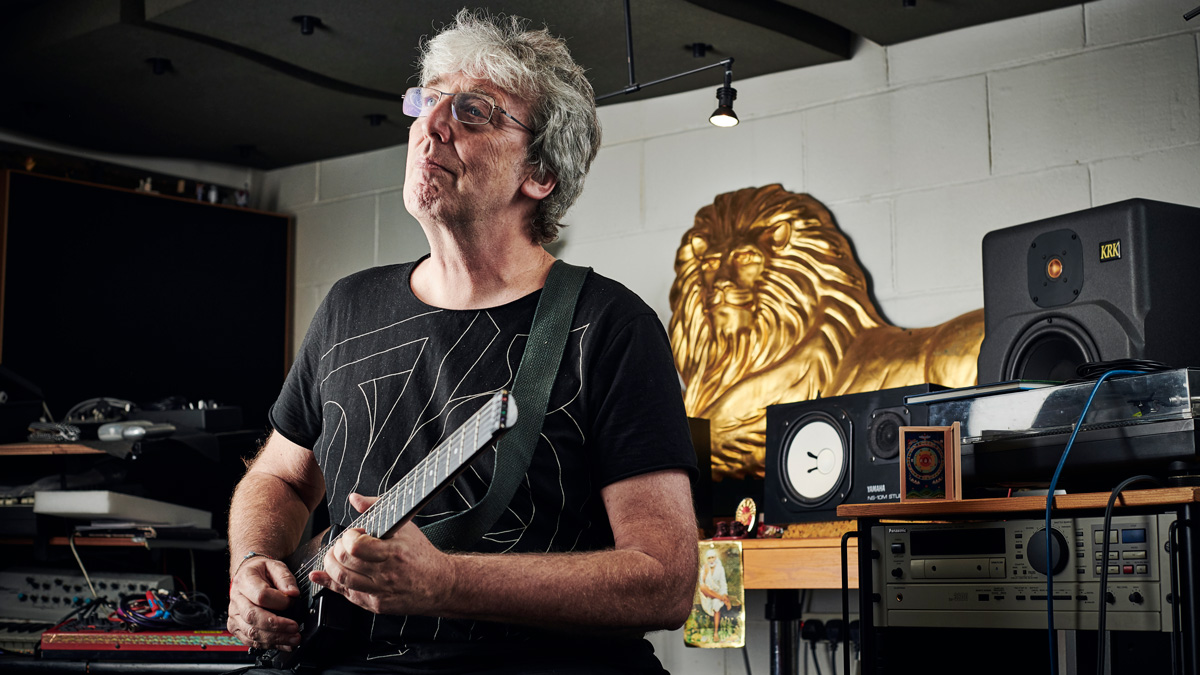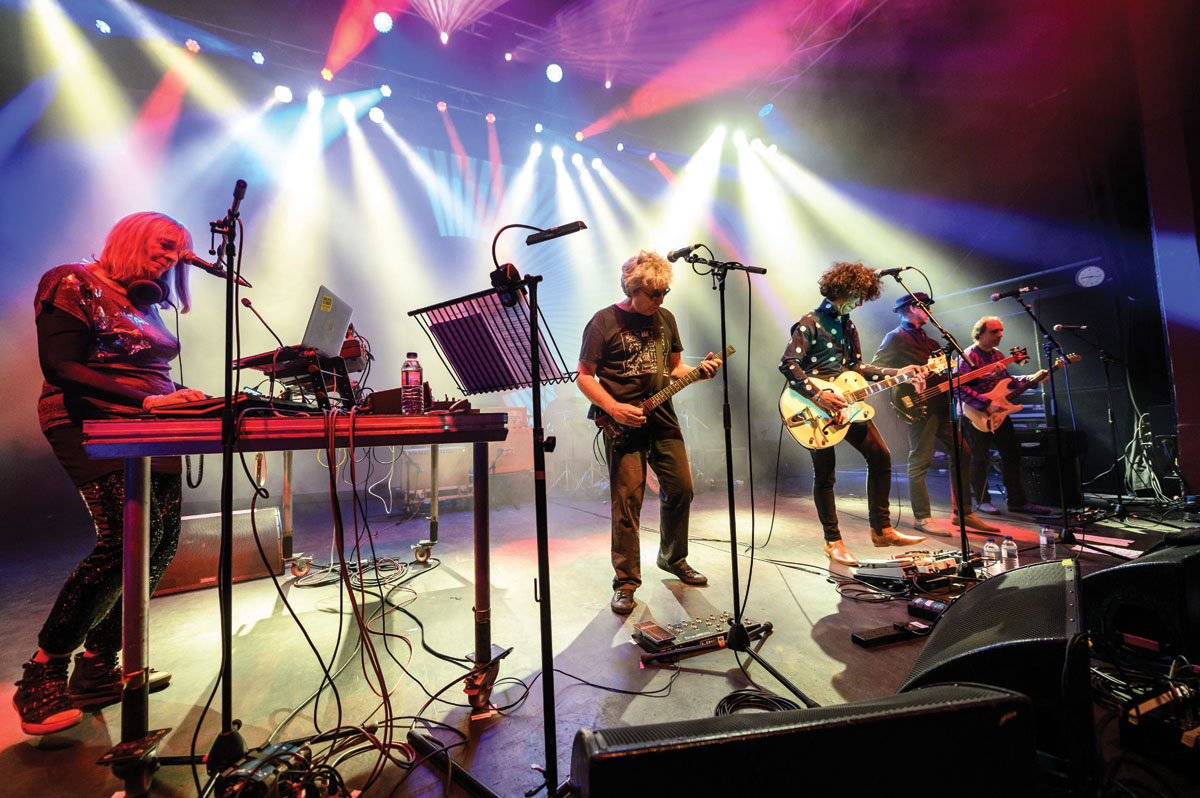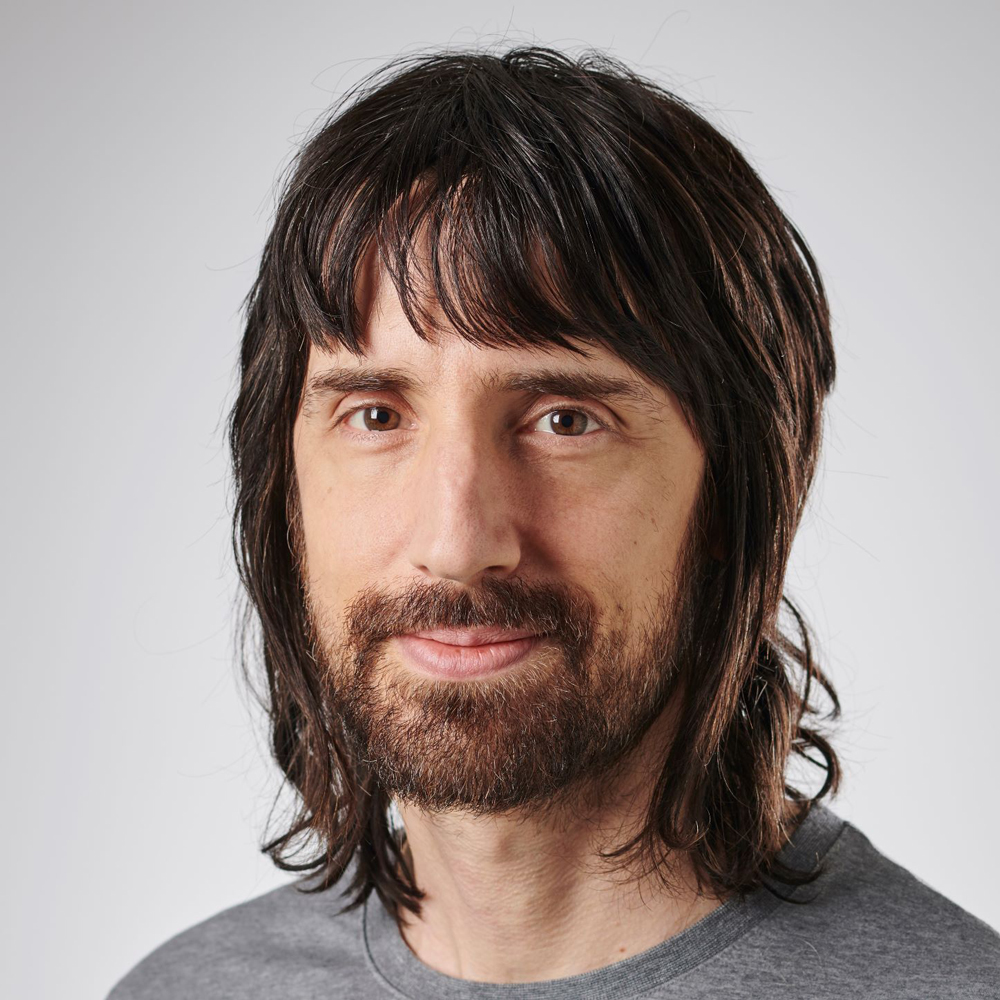Steve Hillage: "Gong was quite chemically fueled and psychedelics were all part of the fun"
Celebrate 50 years of Gong by taking a trip down memory lane with Steve Hillage

Since his first experimental forays into guitar playing in the heady days of 60s London, Steve Hillage’s career in musical psychonautics has crossed many realms, from psychedelic rock to tripped-out electronic dance music.
This year marks the 50th anniversary of Gong, a band who gained cult status during Steve’s tenure with them in the early 70s – also an era that established him as one of the most gifted guitarists of the time.
We caught up with Steve at his London studio (still very much a hub of psychedelic activity), prior to his tour with Gong and his own headline act, to reflect upon his kaleidoscopic career…
School daze
“I was nine when I got my first guitar – a little acoustic with steel strings. I learned to play with a pick and by the time I was 12 I’d got quite good. My first electric guitar was a Watkins Rapier then finally I managed to get a Fender Stratocaster – my first pro guitar – in ’67. I think it was either a ’62 or a ’63. I gradually found my own thing through a long series of experimentations with tape recorders and later on I started getting into tape echo and various echo boxes. That’s how I really developed my personal sound and style.
“When I was about 16 or 17, I would commute on the train every day from Chingford to the City of London School in Central London where I found several other like-minded budding musicians. We ended up forming a band called Uriel, and that’s how it all started."
Within six months of being in Canterbury, I decided to leave university and do music for real
"The other guys in the band wanted to leave the school and go professional, but because of my relationship with my parents I couldn’t do that. So they went off and ended up as a trio called Egg. We were still good friends, though, and we did various collaborations. In fact, we made a psychedelic rock record called Arzachel. That was my first proper recording session. It’s a rare collector’s item now!”
The Canterbury scene
“After school, in the summer of 1969, I arrived at the university in Canterbury and got embroiled in the music scene there. There weren’t a lot of people involved – it was a fairly niche thing, but there definitely was a scene. People had certain shared musical styles and used certain chords like major 7ths and 9th chords and certain melodies and kind of quirky English vocals. It had a colour to it. I’ve no idea where it came from.
Get The Pick Newsletter
All the latest guitar news, interviews, lessons, reviews, deals and more, direct to your inbox!
"Me and my friends from Egg were already fans of Caravan and Soft Machine before I went to Canterbury University, but I didn’t know they were actually based in Canterbury. When I got to the university, I realised it was a kind of musical epicentre. That environment was what gave me the push to become a professional musician.”
Going pro
“Within six months of being in Canterbury, I decided to leave university and do music for real. The guys from Caravan were helpful in getting me management and a record deal. I was friends with these gentlemen and had become acquainted with people like Kevin Ayers and Soft Machine. Daevid Allen had already left Soft Machine by the time I arrived in Canterbury, so I didn’t meet him at that time. I moved back to London and got a record deal with my first group, Kahn, which led to the album Space Shanty [1972].”
Joining Gong
“When I heard [Gong’s] Camembert Electrique I thought it was fantastic. It mixed super-spacey music with quite a raw sound. I loved it and from that point on I developed a keen interest in Gong. At the time, I was not very satisfied with having my own band, Kahn.
"We’d released one album, which had done okay but not spectacularly. I’d written a load of material for a new album, but the record label thought it was a bit too weighty. They wanted something more commercial and I was thinking, ‘I don’t like all this pressure,’ so I decided to split my band up and work with other people."
Once I entered ‘Gong World’, I saw everything differently, but it was very thrilling
“I first met Daevid in October ’72 in London. I told him how much I liked Gong and he said, ‘I’ve heard good things about your guitar playing.’ I told him, ‘I hope we can do something together some time,’ and he said, ‘Could well be!’ I thought, ‘I wonder what this is all about?’ Lo and behold, I got approached by Kevin Ayers to play in his band and we went on a long tour of France.
"Just before Christmas in ’72, some of the Gong guys, including Daevid, came to one of the gigs and Kevin invited Didier [Malherbe], the sax player, to jam with our set. It was a brilliant electrical musical communication. After the gig, Daevid invited me down to their house and that’s when he invited me to join Gong. It was a fantastic moment.”
Down the rabbit hole
“I sometimes refer to joining Gong as ‘taking the red pill’, you know, from that scene in The Matrix [laughs]. Once I entered ‘Gong World’, I saw everything differently, but it was very thrilling. Specifically, I joined for the recording of Flying Teapot [at the start of 1973]. Unfortunately, in the latter part of the recording sessions at Virgin’s new Manor Studio near Oxford, it went a bit pear-shaped because the French record label had suddenly ceased to exist.
"It was nothing to do with Gong, but it all became a complete mess and Daevid and Gilli [Smyth] went off on what eventually became a 13-week sabbatical. The rest of us went back to France to the Gong communal house. There was just the four of us – myself, Didier, Tim Blake, the synthesizer player, and our wonderful and very wise sound-mixing engineer Venux Deluxe [Francis Linon] – and we decided we’d reform the band, continue doing gigs as Gong, and see what happened.”
Communal living
“The communal house was near a city called Sens, about 125km southeast of Paris. It was an inspiring and beautiful place to be. It was fantastic because it had a large separate room that was perfect as a rehearsal room. We called it the Grande Salle – the ‘big room’. We used to spend a lot of time in there just messing about, jamming, experimenting, twiddling, tweaking, this-ing and that-ing."
The line-ups that made Angel’s Egg and You were very strong and very different personalities. It was quite a combustible mix
"It was chaos a lot of the time but we were busy bees. In the spring of ’73, with the new line-up we put together while Gilli and Daevid were away, we wrote a lot of new music and most of that became the Angel’s Egg album. That was the best band I’ve ever been in. It was just really good. And then, when Daevid and Gilli came back, we had the newfound support of Virgin Records.”
Psychedelic explorations
“Gong was quite chemically fuelled and psychedelics were all part of the fun. I was attracted to psychedelics from the mid-60s and I developed a deep interest in spiritual philosophy from quite an early age. Although I never followed any particular doctrine, I was interested in things to do with consciousness and was looking for a deeper meaning at a universal level.
"That’s always been a presence in my life, even before I smoked my first joint. That’s just me; that’s just the way I am. I was always interested in following this up and seeing what, if any, concrete basis there was to it – rather than just purely getting out of it. I suppose that helped me to not become a casualty. You get a lot of insight and experience with psychedelic drugs and I was trying to go to the next level.”
Then there was you
“Unfortunately, we had to leave the French house. It was a pity because I thought Gong had some special factor when it was based in France. We moved to Witney [in Oxfordshire], which was quite convenient because it was near The Manor Studio, where we did a lot of recording. But the place didn’t have a big rehearsal space, so while preparing the You album, we rented this cottage in Wiltshire, about an hour’s drive away in a place called Little Bedwyn.
"That’s where we had the gear set up and where the You album came together in the spring of ’74. It didn’t take us too long to write the material; we had a very productive period and we were doing a lot of jamming.”
Going solo
“I had a whole bunch of material when I joined Gong, which was from the aborted second Kahn album, and that became Fish Rising. A lot of the notes and chords were the same as what I’d written before, but my whole attitude and the way I put it together was heavily modulated by the Gong experience.
I was attracted to psychedelics from the mid‑60s and I developed a deep interest in spiritual philosophy from quite an early age
"I saw that as a side project, in a similar way to Daevid’s solo album Banana Moon, which [drummer] Pip Pyle had played on when he left Kahn. I thought Fish Rising was my Banana Moon. I wasn’t seeing it as some sort of new destination and I had no plans to leave the band. In fact, in ’75 when it all started to disintegrate, it made me sad.”
Leaving Gong
“The line-ups that made Angel’s Egg and You were very strong and very different personalities. It was quite a combustible mix, so maybe it was destined not to last for too long. It made a wonderful whole greater than the sum of the parts, and that’s something I’m grateful for having been part of.
"But looking back, it was inevitable that something had to give. The big problem for me was that in early ’75 I was away finishing off Fish Rising, so I wasn’t able to intervene in disputes. I very much wanted the band to stay together, but I was unable to intervene. It was sad for me.
"And when Daevid decided to leave in April ’75, that was a real shock. Eventually, myself and my partner, Miquette [Giraudy], left. I’m still happy that I contributed to Shamal. It was an amicable split; it wasn’t bitter. I just thought it was time to resume where I left off as a solo artist. I wanted to follow my inspiration. I’d followed my inspiration into Gong and, in the end, I followed my inspiration out of Gong.”

The other side of the glass
“By the beginning of 1980, I was completely burnt out. I hadn’t stopped since Kahn. It was great, but it had been one long rollercoaster ride and I wanted to have a break. After a bit, I thought, ‘I know what I’d like to do; I’d like to become a record producer.’ I’ve always been interested in the production side, ever since my early experimentations with tape recorders.
"I was quite blessed having my solo albums produced by some really gifted producers, such as Todd Rundgren, Malcolm Cecil and Nick Mason. I learned a lot of stuff from those experiences. Having been produced as an artist, I found it easy to switch roles and develop an empathy with the artist I was producing, because I’ve been in their position.
"SVirgin were very helpful for me. They gave me a few good jobs to get me going and it started to work. I did that full time for the next eight or nine years. I did a lot of production work, but I’m not doing very much record production now; it’s just not something that particularly appeals to me.”
System 7
“Electronic music was something I’d been developing an interest in since the 60s. It was just a logical progression for me. Once I took the plunge and decided my next artistic project would be dance music, I was always looking for ways to make the guitar work in that context.
"I think I’ve been quite innovative in that respect. We’ve developed a System 7 sound. We’re not a typical dance music act. That was the original idea. We thought it would sound really cool to mix our basic core sounds, Miquette’s synthesizer sounds, and the glissando guitar from Gong, with really cool dance beats. That was the whole idea. And we’re still doing it. We still derive a lot of pleasure and creative satisfaction from that.”
Gong but not forgotten
“In 2006, Miquette and I played at this three-day event called the ‘Gong Family Unconvention’ at the Melkweg in Amsterdam. System 7 did a whole night of dance music with Eat Static. It featured various Gong members doing their own solo projects and then coming together at the end to play a Gong set. I was also persuaded to do a Steve Hillage Band set prior to the main Gong set. It all went really well and from that point on, I thought, ‘I can do these two things in parallel.’ It’s not a question of whether I either do electronic-based stuff or psychedelic rock-based stuff – I can do them both."
I wanted to follow my inspiration. I’d followed my inspiration into Gong and, in the end, I followed my inspiration out of Gong
"This year, I decided to do a full live show. I’ve got the guys from the current line-up of Gong, an absolutely fantastic band, playing my songs with me as The Steve Hillage Band. Gong are going to be playing their own set as well, before The Steve Hillage Band set, so that’s a really big thing for me.
Gong did its first official gig in October 1969, so 2019 marks the 50th anniversary year of the band. We’re also doing a tour, which will be celebrated with the release of the Virgin boxset [Love from Planet Gong – The Virgin Years 1973-1975].”
Rod Brakes is a music journalist with an expertise in guitars. Having spent many years at the coalface as a guitar dealer and tech, Rod's more recent work as a writer covering artists, industry pros and gear includes contributions for leading publications and websites such as Guitarist, Total Guitar, Guitar World, Guitar Player and MusicRadar in addition to specialist music books, blogs and social media. He is also a lifelong musician.
“I said, ‘Let’s get Hendrix to play on it.’ His manager said, ‘Jimi’s playing shows back-to-back.’ So we got Jimmy Page”: The hit ’60s single that was supposed to feature Jimi Hendrix… but ended up with Jimmy Page
“It was tour, tour, tour. I had this moment where I was like, ‘What do I even want out of music?’”: Yvette Young’s fretboard wizardry was a wake-up call for modern guitar playing – but with her latest pivot, she’s making music to help emo kids go to sleep









![John Mayer and Bob Weir [left] of Dead & Company photographed against a grey background. Mayer wears a blue overshirt and has his signature Silver Sky on his shoulder. Weir wears grey and a bolo tie.](https://cdn.mos.cms.futurecdn.net/C6niSAybzVCHoYcpJ8ZZgE.jpg)

